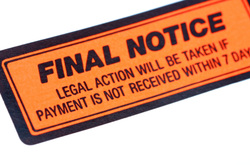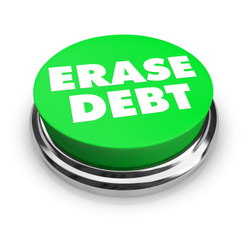 Someone is short selling their home. The mortgage is with ABC Bank. They happen to have their checking or savings account at ABC Bank. So they stop paying on their mortgage. They thought their checking account was safe because it is a different account from their mortgage.
Then one day their debit card stops working. "Hmm, this is weird. I know I have money in this account. It should be working," they think to themselves. They go check their bank account balance and find out it has been sucked dry. In addition, their savings account has been wiped out as well. What could have happened?
Their lender levied their bank accounts to pay the mortgage that month. The sad thing is that most people in this situation are close to broke. Having their last bit of savings wiped out is devastating. Now they don't even have enough money for gas to get to work. Here is how to avoid having this happen to you. If you get behind on any type of loan, make sure your checking and savings accounts are with a separate entity. If you are behind on a car payment, move your account elsewhere. Make sure that your bank is not owned by the same institution.
For example, Wells Fargo recently purchased Wachovia. JP Morgan Chase purchased Washington Mutual. Bank of America purchased Countrywide. Now, some people think this doesn't matter because these lenders are so big. "Bank of America is huge! They will never notice that I have my checking account with them," they tell me.
Yes, that is often true. They might not notice. Or I've had people make the argument that they aren't allowed to levy a bank account. Yes, that might be true as well. But do you have time to read through the 20 pages of fine print for when you first opened your checking account? I'm not a lawyer and I would never try to go through all that. It's much simpler to simply move your account elsewhere before you miss a payment.
 People with a VA loan often ask if they are eligible for a short sale. The answer is yes. A VA Short Sale is called a VA Compromise Sale. The Department of Veterans Affairs publicly releases copies of the Compromise Sale Guidelines. We usually list the property for sale and then submit all the short sale paperwork after a contract is accepted by the seller.
The lender will order a VA Appraisal. All the appraisals go through a VA Loan Center. There are nine Regional VA Loan Centers as of today. After the appraisal is done, I always call the local VA Loan Center. I fax them a request for a copy of the appraisal.
Upon receipt of my request they fax me a full copy of the appraisal. I can see everything on the appraisal. All the comparable sales they used, etc. I love it because it makes the short sale process more transparent. Now if only we could get Fannie Mae & Freddie Mac to do the same thing! If I think the appraisal has inaccuracies, I can request a dispute. Most of the Loan Centers have an appraiser on staff that handles disputes.
Here is how to find out if you have a VA Loan. On the mortgage recorded in the public records, usually 1-4 pages past the signature page will be a VA Rider. At the top, it will say, "NOTICE: THIS LOAN IS NOT ASSUMABLE WITHOUT THE APPROVAL OF THE DEPARTMENT OF VETERANS AFFAIRS." The page for the VA mortgage was two pages below the original signature page of the mortgage. The pages between this and the signature page had the notary signature and the legal description.
These are fairly simple short sales. They are tougher than others because VA will not accept a sales that nets them less than 88.13% of the VA appraisal. I don't think they allow exemptions. I don't know because I have never asked for one. The lenders are not delegated, at least not in my experience. The process is the lender assembles a package and submits to VA. Will I get a Deficiency Judgment on a VA Short Sale? They will give a complete release if a seller participates in the short sale program.
But the borrower has to pay back the loss to be eligible for a VA loan again in the future.
 Many people are embarrassed that they are short selling their house. They feel like a failure. Others think that they are somehow being dishonest or shady. Neither one of those is true. A lot of the people short selling today never had a blemish in their credit. They lived responsible financial lives.
Then the real estate market crashed and left them owing hundreds of thousands of dollars more than their home was worth. For years everyone had told them that couldn't happen. Many of those people also lost their job for the first time in their life. It's interesting because today we are seeing as many short sales in the upper income brackets as the lower income brackets.
I'm not judgmental of someone who is short selling their home. I deal with people from all walks of life. Some are high income. Others bought less expensive homes. Either way, it doesn't matter to me. I see a short sale as a smart financial decision. I'll be congratulating you instead of judging you.. Who wants to be burdened with a huge debt for the rest of your life? Not me. And neither should you.
Here is why a short sale is a smart financial decision. Let's say that you are upside down on a house by $100,000. (If you upside down by an amount lower than $100,000, then don't laugh. Many people are upside down by that amount and more.) Repaying $100,000 over 30 years, will cost you $215,000. That is the $100,000 originally owed, along with $115,000 in interest payments. The number varies according to your interest rate.
What if instead of repaying that money, you put that money towards retirement? Let's say you took that monthly payment and invested it as an 8 percent interest rate. At the end of 30 years, you would have $804.545.01 saved up. Wouldn't that be helpful in retirement? That is one small reason I recommend short sales to my customers. You can get the upside down debt forgiven in a short sale.
 Many people short sale because they are having financial problems and can't afford their home. Financial problems also means that you get lots of calls from debt collectors. Here is a scary story about a guy who was ripped off by a debt collector. The debt collector asked if he could pay them $500. He wanted to do the right thing. So he agreed to pay the $500.
The debt collector sent him a form to make the payment thru his checking account. He filled out the form and signed off on it. The debt collector proceeded to completely drain his bank account. They sucked out $1,800. This caused major financial problems for this guy. He couldn't afford gas to get to work. But, it was all completely legal because of the fine print on the bottom of their form.
The moral of the story? Never give any of your financial information to a debt collector or anyone. If you do send money to a debt collector, then use a payment method that can't be tracked. A money order is a good option. Money orders keep all of your bank account information private. You can buy one with cash or a debit card. The debt collector will never get your account information. Never give any of your financial information to a debt collector. Do not send them info on your checking account, savings account, IRA, 401k, or any other financial account you have.
Many state and federal laws often give a debt collector permission to take money out of your accounts, with or without your permission. Unless you are a lawyer, you won't know if or when they can take money. So you are simply better off never giving them your info. The debt collection company that I mentioned above is based out of Colorado. They tried to collect from another person I know. They were very pushy. They only wanted his checking account info. They wouldn't accept any other payment method. It appears they use that tactic on everyone they call. I hope this helps you in your situation.
 “Why would I short sell my house instead of saving the monthly payments and letting it go into foreclosure?” -Kathy
Kelly, if you stop paying your mortgage, then you can live in your home rent free for 12 to 24 months, depending on the state you are located within. I have seen lenders wait a year after the first missed payment just to file for foreclosure. Yes, you can live in your house for free for a long time. However, a short sale has many advantages over a foreclosure.
It does less damage to your credit and allows you to buy another home in three years versus the five to seven years after a foreclosure. In addition, you can get some money as an incentive for doing the short sale. If you want the benefits of both, then stay in your home until the foreclosure case has been started. Then, start working on a short sale agent. A short sale can take anywhere from 3 months to even 6-9 months to process.
This will allow you to salvage your credit and live "rent free" for 12 to 24 months. You will be able to wipe out all that upside down debt and move on with your life. Best of all, you will be eligible to buy another home in two to three years once you are back on your feet.
 The biggest reason anyone short sells their house is to avoid foreclosure. They cannot afford the house anymore and the bank has is threatening to foreclose. If the short sale is not successful, then their lender will foreclose on the house. We at the Stop Foreclosure Institute have successfully closed short sales for several years.We’ve made it our business to know what we are doing. But, we see many agents trying to help people that have no clue about short sales, or the short sale process. This gives short sales a bad name. Many agents have been involved in short sales where the listing agent didn’t know what they were doing.Because of that the short sale wasn’t successful and that agent and their customer wasted time. In the future they are going to think twice before showing a short sale. This hurts other short sale sellers. It really gets on my nerves that people who don’t know what they are doing can ruin it for everyone else. If you are thinking about short selling your home, make sure you hire a competent, experienced short sale agent. (A competent, experienced agent will be successful at 80-90% of all the short sales they take on.)Here are a few of the things that agent should avoid. - Submitting multiple offers to the short sale lender. Only the best offer should be submitted. A confused mind says no. Most short sale negotiators have between 50 and 200 short sale files on their desk. To ask them to weigh the benefits of 3 short sale offers on just one of those 50 files is probably more than their brain can handle. No, I’m not saying their brain is stupid. It’s just that a human brain can only handle so much information before it stops working. You must remember that most short sale negotiators are handling 50-100 different files at one time. They can't possibly remember all the details in 50 different files!
- Realtors submitting incomplete paperwork to the short sale lender. There is a method to follow. Every good short sale realtor understands stacking order, and the importance of easy to read paperwork.
- Submitting low offers to the lender. All this does is waste time. If a lender is not likely to accept the offer, then don’t waste 45-60 days negotiating it with them. Get an offer at (or near) fair market value and submit that to the short sale lender. That helps avoid wasting everyone’s time.
 I recently met a Realtor who sells properties in a beach town. She said that short sales take 9 to 12 months, and the banks are so hard to deal with. She mentioned short selling a customer’s property. The sellers were two doctors that had to take a promissory note. The sale was for $900k, so the loss must have been above average.
In this case, her customer’s were okay with a promissory note. But, what if you want to short sale and walk away from the upside down debt? What can you to do short sell your home without a promissory note. Negotiating short sales on more expensive homes is different than your average short sale. The most common loan types that will give you a complete release are Fannie Mae, Freddie Mac, FHA, and VA. Most of them won’t loan on a mortgage over $417,000.
There are a few exceptions, but that is the general rule. If your mortgage amount is more than $417,000, then your loan is probably owned by the bank you originally got it from or it has been secuitized. Many of these loan owners will not grant a release. You will have to use other methods. First, you can tell them that you are broke. If that true, they may let you off without much ado.
If you have assets, you will need to use different tactics. You can hire someone to do a “Loan Audit.” This is where they go through your loan file and search for any violations of lending laws. Maybe they didn’t give you the proper federally required mortgage disclosures. Maybe the mortgage broker or lending company wasn’t properly licensed. A loan audit will often help your case. But it isn’t an “end all, be all”. I’ve seen people promote it as that. Another thing you can do is hire on a good attorney. You will want to deal with someone who is a consumer advocate.
They will know how to use the law to negotiate from a position of power on your short sale. In my opinion, the best way to hire lawyer in this case is on a contingency. Tell the lawyer, "I will pay you X when you get me what I want." Some people think lawyers drag cases on just to earn more money. Using a payment arrangement like this will help you avoid that. However, the most important thing you can do is to hire on an experienced short sale agent. Ask them if they have negotiated any short sales where the lender asked for a promissory note.
Then, ask them what they did to negotiate away the promissory note. The good short sale agents will usually know a good attorney. They may have experience dealing with your bank. Bottom line: They are the person who can point you in the right direction so you can short sale and walk away with a complete release from the debt.
 Banks do not accept a potential short sale for a number of different reasons. Here is the biggest reason they did not approve your short sales. They think the property is worth more than the price the buyer is offering. For example, the buyer is willing to pay $319,000 for a short sale.
The bank wants to check and make sure the home is not worth more than $319,000 before approving the sale. They order an appraisal. The appraiser stats that the home is worth $350,000. The bank is already losing money on the sale. They don't want to lose an extra $31,000 on the sale. If this happens the bank usually asks the buyer to raise their offer to the appraised value. Often times the buyer will agree to pay the higher price.
Reason #2: The lender doesn't have a complete short sale package. Maybe the seller's last 2 bank statements are missing. Or a page is missing from the sales contract. In that case, the necessary paperwork will be sent to the lender.
Reason #3: The offer doesn't meet the short sale guidelines. Every lender has different guidelines for whether they will accept or reject a short sale. For example, the owner of the loan might be Fannie Mae. Fannie Mae has specific short sale guidelines. Unless the short sale offer meets those guidelines, it will be rejected.
Reason #4: Unrealistic expectations from the lender. Every lender has a specific employee who negotiates and processes the short sales. That employee is called a short sale negotiator. This employee has a lot of discretion over what they will and will not approve. We have seen those employees make up their own guidelines. They decide that Fannie Mae's short sale guidelines aren't good enough. So they demand more money from the buyer. Or they want the seller to give up their entire life's savings.
If the seller or buyer do not agree, then they will turn down the short sale offer. Never mind that they do not own the loan. If the short sale is turned down then the owner of the loan, Fannie Mae, risks losing even more money. Most short sales that are foreclosed upon end up selling as a bank owned property. The Boston Consulting Group recently did a study on short sales. They studied what a lender would net when selling a home either as a short sale or a bank owned property. They discovered that banks lose twice as much money on bank owned sales versus what they lose on short sales. What should your agent do with a short sale negotiator at the bank who doesn't follow the short sale guidelines?
We gently remind them of the loan owner's guidelines. They usually approve the file. If that doesn't work, then we will notify their supervisor or someone higher up at the bank. That solves the problem most of the time. But, if it doesn't, then we contact the owner of the loan directly and let them know what is happening. That is the basis of what we do to get your short sale approved and help you move on with your life.
 Many people have a hard time believing that their lender would agree to allow them to short sale and walk away from the upside down debt. If you have ever gotten behind on payments, then you know how mean the debt collectors can be. The constant barrage of threats, demands, and phone calls usually proves to be too much for most people.
As a result they give up. Debt collectors are mean. But, it is a tough job (although I have no sympathy for them.) I know someone who used to work as a debt collector. He quit after a couple of weeks. It was just too harsh and depressing. They get on the phone every day for 8 hours of abuse. Some of the people they call scream at them.
Very few people are nice. It's probably very depressing because you hear about other people's problems all day long. The debt collectors become cold and callous as a result of the work. As a result, they take their frustrations out on the people they call. If you are trying to negotiate a loan modification or short sale, do not work with the debt collection people. They don't want you to modify your loan or keep your home. Why is that? Because they are paid bonuses on the money they collect.
They don't receive a bonus if you short sale or modify your loan. The debt collection people are an ugly, dull, almost useless tool. The lenders use them in a half-hearted attempt to get you to pay. You see lenders don't want you to short sale or modify your loan. They just want you to catch up your payments and start paying on time again. That way they don't lose any money. The debt collectors are the first line of offense. "Sic em", they say to the debt collectors, hoping they can convince you to catch up your payments.
Fortunately, when we negotiate a short sale we talk to a different group of people. These people work in a different department. They are not callous and cold. They don't hate their job. They are paid substantially better than the debt collection folks. For most it is an actual career. These people have training. They approve and deny short sales based on set criteria. Their job is to process the short sale, not collect money. They know that most people are selling their home because they can't afford the payments. So they don't bring it up.
We do all the negotiations and discussions with them. That means when you start the short sale process, you don't have to talk to the people at your lender anymore. We take over and handle everything for you. You can rest easy knowing that someone else will be negotiating on your behalf with your lender.
 This short sale program is ideal for someone who needs to move to an affordable home and cannot afford to pay their current mortgage payment. HAFA will provide you with free advice from HUD-approved counselors and the sale will be less harmful to your credit than a foreclosure or the typical short sale procedure.
You also will be paid $3000 to pay for relocation costs. If you qualify for HAFA, then your mortgage company will work with you to short sell your home. The good news is that HAFA guidelines stipulate that after you sell your home, then you are released from the debt. This is the biggest reason some people choose the HAFA short sale program versus a conventional short sale.
To qualify for The HAFA program you must be suffering from a hardship (loss of income, increased mortgage payment, etc). It is unlikely that you will qualify for the program without a hardship. The mortgage that you owe to the bank or to a third party must be less than $729,750 and for your personal residence. In addition, you must have obtained your mortgage on or before January 1, 2009. Your mortgage payment, taxes and insurance payments must not be more than 31 percent of your total monthly income, and you should not have bought any property in the last 12 months. The program requires you to apply for the Home Affordable Modification Program (also known as HAMP) before moving forward with the short sale.
|











 RSS Feed
RSS Feed